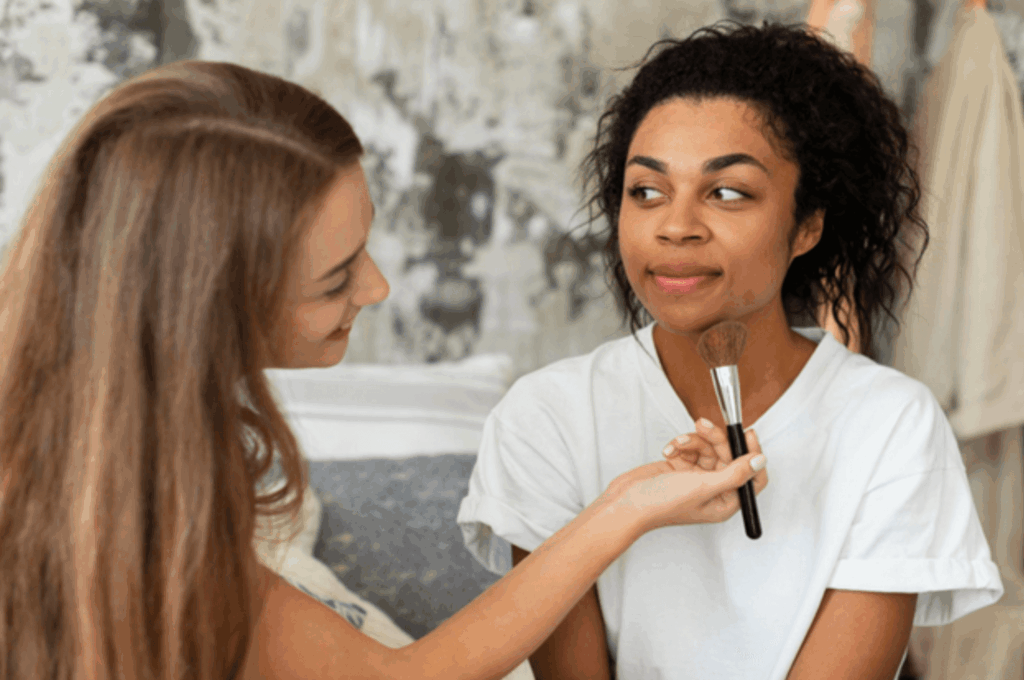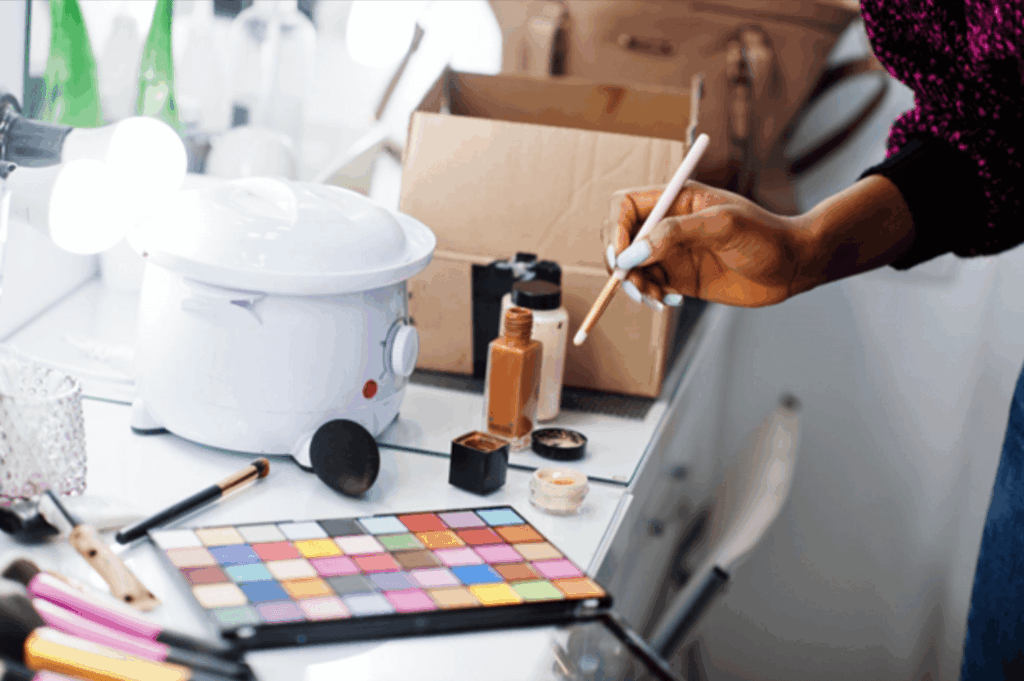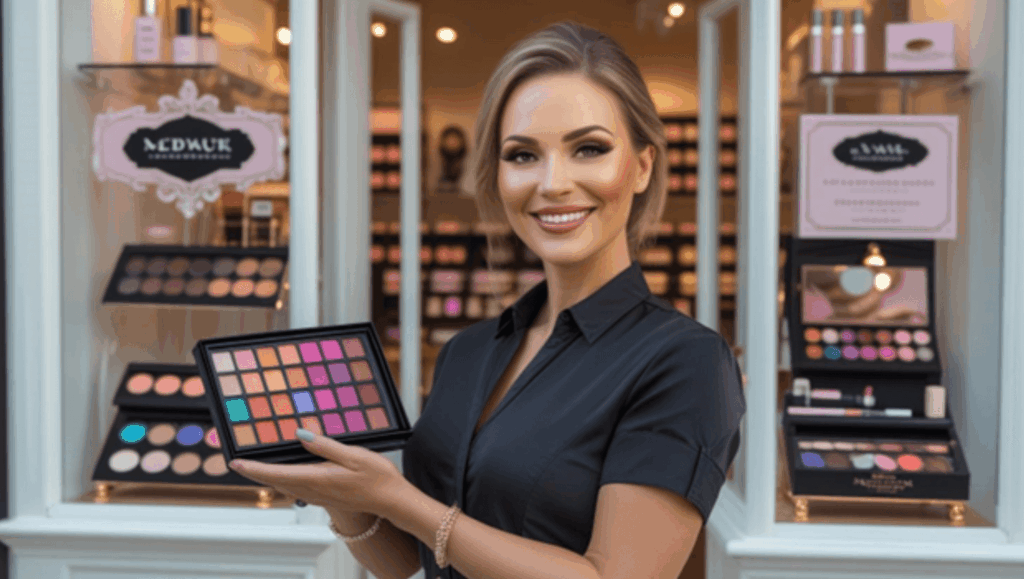How to Become a Makeup Artist – Top 10 Tips

Table of Contents
Starting as a makeup artist can come with the thrill and excitement of going after your passion, monetizing your skill, putting a smile on people’s faces, and the joy of elevating their beauty? Contagious!
However, becoming a successful makeup artist isn’t just about luck or your passion for beauty. I worked closely with many makeup artists on their rise, and I know that success requires skill, gaining knowledge, knowing what works, what to avoid, and how to carve out your path.
In this article, I’ll be sharing the top 10 tips for becoming a makeup artist. These are not just tips; they are practical, real-world advice that will help you build a strong foundation, avoid common pitfalls, and stand out in this competitive beauty market. Ready to transform this passion into a thriving profession? Let’s dive in!
What Does a Makeup Artist Do?
Technically, we all know what a makeup artist does. To put it into a definition, a makeup artist is a creative professional who uses beauty products to enhance, transform, or completely change a person’s look. However, what they do spans beyond that, which makes it possible for them to work across various industries, ranging from bridal and beauty to film, television, fashion, and even special effects.
Makeup artists now have various specializations, from natural, everyday looks to theatrical makeup, high-drama editorial, unbelievable transformations, or creating realistic wounds and characters for film and TV.
Responsibilities of a Makeup Artist
Yes, the job of a makeup artist goes beyond applying beauty products. It is now a big system involving different stages and tasks. The process involves steps such as:
- Consulting with clients or creative directors to understand the concept of a desired look
- Prepping the skin before applying any makeup
- Applying makeup products based on the client’s skin tone, face shape, and occasion
- Using advanced techniques like contouring, color correction, and airbrushing
- Selecting the perfect tools and products for various skin types and lighting conditions, and several others.
Overall, these responsibilities establish that the concept of makeup artistry combines technical skill, creativity, and an understanding of human features to bring that fantasy or artistic vision to life.
5 Qualities of the Perfect Makeup Artist
Developing your skill as a makeup artist takes tons of practice; however, becoming a great makeup artist requires that you stand out in your mindset, attitude, and how you work with others. Here are five qualities that are essential to become a successful makeup artist:
1. Creativity
Makeup is an artistic venture, and for a makeup artist, every face is a blank canvas, waiting to be explored. Great makeup artists are imaginative, constantly exploring new looks, styles, and techniques. They stay up-to-date and are constantly inspired by trends. However, they stand out by adding their twist to upgrade the entire look. If you are curious about other artistic ventures, you can read my article on being a successful manicurist.
2. Attention to Detail
Great attention to detail is what differentiates the ordinary from the extraordinary. An expert notices the little things others would technically miss, and this is where exceptional works are born.
3. Patience
Patience is a virtue, and it definitely applies to scaling up as a makeup artist. Not every client knows what they want at the beginning, and not every look you envision goes exactly how you want. However, patience helps you stay calm during long shoots, complex transformations, or last-minute changes, all while ensuring that your client is comfortable.
4. Excellent Communication Skills
Good communication skills help you explain your process, listen to your client’s needs, and offer gentle guidance. Being a great makeup artist requires that you be collaborative and building trust through great communication sets you apart.
5. Professionalism
You can’t go far in building your brand as a makeup artist if you struggle with showing up on time, keeping your tools clean, and maintaining a positive attitude even under pressure. Clients and collaborators will always remember how you make them feel while working with you, just as much as your work.
Top 10 Tips on Becoming a Makeup Artist
Now that we know what the qualities it takes to become a perfect makeup artist, we will go over the top 10 practical tips on how to become a makeup artist and turn this passion into a full-time, thriving profession. These tips include:
1. Define Your Niche Early
Defining your niche as early as you can is one of the smartest things you can do as an aspiring makeup artist. With how broad the beauty industry is, you would be doing yourself a great disservice, trying to be everything to everyone.
Focusing on a specific area as a makeup artist helps you sharpen your skills faster while attracting the perfect opportunities, right clients, and collaborations. This strategy matters because:
- Focusing helps build your identity and style as an artist.
- You are on your way to becoming the go-to expert in that category
- It makes your marketing more focused and effective.
It’s okay to be unsure about what niche to specialize in. You can gain clarity by exploring a few different areas early in your journey. Furthermore, you should pay attention to what excites you most and focus on what people consistently compliment you on. Ensure that your niche combines your skills, interests, and market demand.
2. Invest in Quality Education
You see, talent is great, but technique, knowledge, and professionalism all come from learning, honing, and deliberately refining your craft. This is an important reason why investing in quality education is necessary to become a successful makeup artist.
Your learning options could range from makeup schools, workshops, or masterclasses, online courses & tutorials with Kemp Center, and even learning on the job. Ensure you look for instructors with industry experience and a comprehensive curriculum that offers hands-on practice opportunities.
3. Strategically Build a Starter Kit

You don’t need all the trending products! It is relatively easy to fall into the temptation of splurging on every product you come across. However, it takes a smart makeup artist to know that it’s not about quantity, it’s about versatility and quality.
You should start by carefully putting together a starter kit that includes the essentials that allow you to work on various skin tones and types. It’s best to focus on products with reuse value, reliable tools, and a clean, professional setup.
You don’t need the most expensive brands to get started; however, you need products that actually perform well, turn out nicely, and can last throughout a full day of wear. In addition, it’s important to think beyond just makeup, as your kit should contain sanitizers, disposables, a sturdy brush set, and good lighting.
In all, I advise that you start small, buy smart, and upgrade as your career grows. A well-curated kit saves you time and money and shows clients that you take your work seriously.
4. Practice on Every Skin Type and Face Shape
We have seen time and again how upcoming makeup artists make the mistake of just practicing on themselves or people with their skin tone or type. However, in the real world, you get clients from various backgrounds with different skin tones, face shapes, textures, and facial features.
The more diverse your practice, the more confident and capable you’ll be in any situation. Becoming a successful makeup artist entails hands-on experience with oily, dry, mature, acne-prone, and sensitive skin.
You should learn how makeup acts on deep, fair, warm, and cool complexions, play with contouring on different face shapes, figure out what works for one client, and understand why it doesn’t on another. Keep in mind that every face you work on teaches you something new, so don’t shy away from pushing yourself and seeking challenges.
5. Focus on Building a Portfolio
Building a portfolio is important for every creative, including a makeup artist. Your portfolio serves as your visual resume, and it determines whether potential clients, brands, and collaborators will decide to work with you or not. So, regardless of how ready you are, it’s important to start building one from the very beginning.
Your work should be taken in clear, well-lit environments, even when you’re just practicing. When putting your work out there, ensure that you show range by capturing different looks, skin tones, and settings, using what you have and improving as you progress.
As you grow, your portfolio grows. Keep your best, most relevant work at the frontline of your portfolio, constantly showcasing the looks you want to be hired for. Regardless of what niche it is, let your portfolio speak and reflect your skill, style, and professionalism.
6. Promote Yourself Online
Having a strong online presence is essential in becoming a makeup artist, with social media being one of the most powerful ways to showcase your work, build credibility, and attract clients.
You should start by carefully considering what platforms your target audience spends their time on. Show off your talent and your personality by keeping your feed clean, consistent, and visually appealing. Share behind-the-scenes clips, product reviews, mini tutorials, or even time-lapse videos of your process.
Take note that the more visible and authentic your online presence is, the more opportunities you will find. A simple, well-designed website or portfolio page does wonders for your brand.
Furthermore, make it easy for people to contact you, see your work, and understand what services you offer. Never underestimate the power of engaging with others; comment, collaborate, and connect with others to show off all you have to offer.
7. Network and Collaborate with Other Creatives
As a makeup artist, you don’t build a career alone. In fact, some of your golden opportunities might come from collaborating with other creatives, photographers, models, stylists, hair artists, designers, and sometimes other makeup artists.
First, you need to start by putting yourself out there, by attending local events, makeup expos, fashion shows, or creative meetups. It’s also important to connect on social media with people whose work you admire and be open to reaching out for and accepting collaborations.
Remember that collaborating with others gives you real-world experience, helps you learn to work as part of a team, and could even lead to referrals down the line. Furthermore, you get exposed to new styles, workflows, and creative challenges, sharpening your skills and giving you a fresh perspective.
8. Learn the Business Side

Putting in the effort, time, and work will build your skills. However, understanding the business side is what transforms your passion into a career. Whether you’re freelancing or working as an entrepreneur, what you do goes beyond just applying makeup.
Your job entails managing bookings, determining your price range, building client relationships, drafting budgets for your kit, marketing your services, and sometimes handling contracts and invoices. It’s obvious how all of this can be a lot, but learning how to properly handle your business well drastically sets you apart.
First, clarify your pricing by understanding your worth, which factors in your time, skill level, and various management costs. You should learn to communicate clearly with clients, manage cancellations, feedback, and reviews professionally, and set boundaries that protect your time and energy.
Learning the business aspects also involves tracking your income and expenses, understanding basic taxes, and exploring ways to scale, whether through offering lessons, collaborating, or building packages.
Finally, it’s important to understand that you don’t need to be a financial expert to have a solid grasp on the business side of things, all you need is this business management course that teaches you all you need to know.
9. Stay Updated with Trends and Products
Change is ever constant in the beauty industry, as the rate at which new product launches, techniques, tools, and trends surface can be scary. For a makeup artist, this means that staying relevant means staying informed, as clients notice when you’re current, which can add serious credibility to your work.
Note that I don’t mean to say that you should follow every trend blindly. Instead, I advise that you stay curious and explore with an open mind.
In addition, follow respected artists, brands, and educators online, subscribe to newsletters, watch tutorials, and take note of emerging techniques. Test out new products to see how they perform on different skin types and textures. The goal isn’t to chase trends, but to understand them well enough to decide how, when, or whether to use them.
10. Be Reliable, Professional, and Kind
In all, you should always remember how important being a professional is in this career. As much as your skills and talent will have people wanting to work with you, your professionalism is what keeps them coming back. Endeavor to be kind, reliable, and respectful, as your clients will remember how you made them feel.
Learn to keep your energy calm, particularly in high-pressure environments like weddings, photoshoots, or film sets. Treat every client like they are your last, with regard and respect, regardless of their budget or experience with makeup.
Furthermore, always keep in mind that word of mouth is everything. The skill gets attention, professionalism builds trust, and kindness earns loyalty. Loyalty that might have them mentioning your name in rooms that your online presence or skills won’t get you in.
Getting Started as a Makeup Artist
I’ll conclude this detailed guide with this: becoming a successful makeup artist takes more than just your love for beauty; it takes consistency, dedication, discipline, strategy, and commitment. At whatever level you are, you need to always remember to fix your eyes on the goal and focus on only the things that really matter.
This practical guide could serve as your roadmap to thriving as a makeup artist. Interested in beginning this journey? Start with this makeup course, covered by a professional, where you can gain valuable makeup skills.
